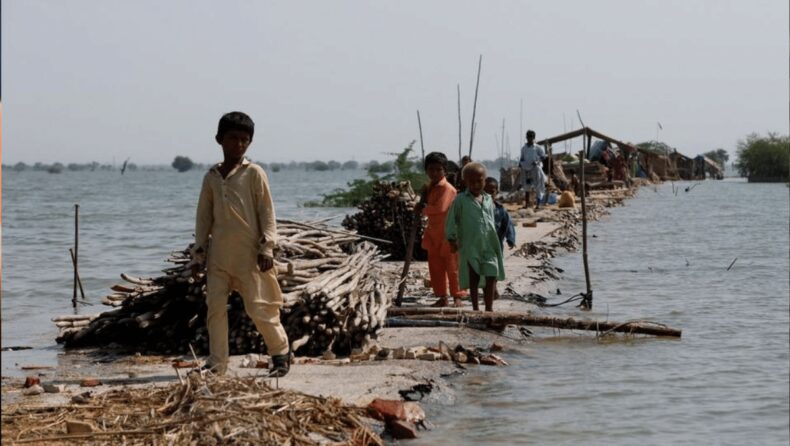Large portions of the South Asian nation have been inundated by the floods, which have also claimed almost 1,700 lives. Numerous tens of thousands of displaced individuals are living outdoors
The floods have flooded vast areas of the South Asian nation and killed close to 1,700 people. Many of the displaced are living in the open in their hundreds of thousands.

At the opening of a new UN appeal for aid, Pakistan’s climate change minister warned on Tuesday that the country cannot afford to spend additional money recovering from the devastating floods that have been linked to climate change.
After weeks of severe floods, the United Nations increased its humanitarian appeal for Pakistan by five times, from $160 million to $816 million. This was done in response to the surge in water-borne illnesses and concern over growing hunger.
“We have no space to give our economy any stimulus… the developed world should accelerate funding for climate hit disasters,” the climate change minister, Sherry Rehman, told a conference on aid for Pakistan in Geneva.
Large portions of the South Asian nation have been inundated by the floods, which have also claimed almost 1,700 lives. Numerous tens of thousands of displaced individuals are living outdoors.
Out of a population of 220 million, 33 million were affected by the deluge, which was brought on by record monsoon rains and rapid glacial melt in northern mountains. The government estimates that $30 billion in damage was caused.
The calamity has been attributed to climate change by the government and the UN.
The $816 million goal for the appeal, according to Julien Harneis, the UN resident coordinator and humanitarian coordinator in Pakistan, is “very insufficient.”
According to Ms. Rehman, 8.2 million people in Pakistan require urgent access to medications, and additional food supplies will need to be imported.
Pakistan was “on the verge of a public health crisis,” said Tedros Adhanom Ghebreyesus, director general of the World Health Organization.
33 million out of 220 million people have been affected by the flood, and it has destroyed crops, roads, animals, bridges, residences, schools, and medical facilities, causing damage the government estimates to be $30 billion.
The calamity has been attributed to climate change by the government and the UN.
The $816 million goal for the appeal, according to Julien Harneis, the U.N. resident coordinator and humanitarian coordinator in Pakistan, is “simply not enough.”
Rehman claimed that 8.2 million people in Pakistan urgently needed treatment and that additional food supplies would need to be imported because the nation’s export crops had been destroyed by flooding.
Pakistan was “on the verge of a public health crisis,” said Tedros Adhanom Ghebreyesus, director general of the World Health Organization.
According to the Ministry of Foreign Affairs, the United Nations and Pakistan have launched a new flash appeal in an effort to raise more than USD 800 million for the rehabilitation of millions of Pakistanis affected by the devastating floods, which have already claimed the lives of over 1,700 people.
The UN increased its humanitarian request for Pakistan by five times, to USD 816 million from USD 160 million, as part of a new appeal that was unveiled on Monday during a ceremony in Geneva.
The UN is making this adjustment in an effort to stem the tide of water-borne diseases that have been reported from various parts of the country that are still suffering from floods.
The Minister for Climate Change, Sherry Rehman, underlined the necessity of prompt action to protect Pakistan’s flood victims from the consequences of impending cold weather during her speech at the occasion.
The minister added, “The flood-stricken in Pakistan are facing a true race against time since winter is coming,” and that despite the availability of shelters for 598,000 people, up to 7.5 million impacted people were still looking for dry land.
33 million people have been impacted by the disastrous floods across the nation, which have already claimed 1,700 lives and ruined big farms, leading to a crisis-like situation owing to a lack of necessities.
Rehman warned the crowd that 34 districts were still impacted by the disaster 16 weeks later, and that many victims were still looking for land centers to access food, clean water, and medical care, as well as dry areas in Sindh to bury their deceased.













